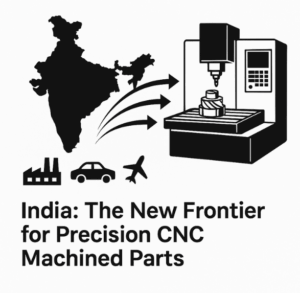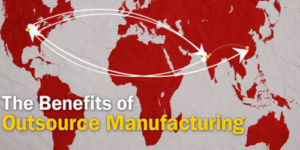As the global manufacturing landscape continues to evolve, companies around the world are rethinking their supply chains to reduce risk, improve agility, and maintain cost-efficiency. One of the most prominent shifts in strategy is what’s known as the “China +1” approach — a model where businesses continue to source from China but diversify production by adding at least one other country to their manufacturing base.
For companies focused on precision machining and contract manufacturing, this strategy is more than a smart move — it’s a critical pivot to future-proof operations.
What Is the China +1 Strategy?
The China +1 strategy emerged in response to rising costs, geopolitical tension, and supply chain disruptions associated with relying solely on China. By establishing secondary production capabilities in countries like India, Vietnam, or Mexico, manufacturers can mitigate risk while maintaining global reach.
For industries that rely on high-precision CNC machining, tight tolerances, and just-in-time delivery — such as aerospace, medical, automotive, and electronics — the need for a backup or parallel supply source is even more urgent.
Why Precision Machining Demands Diversification
Precision machining isn’t just about cutting metal — it’s about delivering accuracy, repeatability, and reliability under tight production timelines. Any disruption in supply can lead to downstream delays, quality control issues, or even lost contracts.
Here’s why relying solely on China has become increasingly risky for high-precision manufacturing:
❌ Geopolitical Volatility
U.S.-China tensions, trade sanctions, and regulatory unpredictability can cause unexpected delays or cost escalations.
❌ Rising Labor Costs
With average labor rates in China nearing $5.50/hour, the cost advantage for CNC-intensive operations is shrinking.
❌ Supply Chain Bottlenecks
Lockdowns, port closures, and raw material shortages in recent years have exposed how fragile single-country sourcing can be — particularly in high-spec sectors.
Why India Is the Ideal “+1” for Precision Machining
At Spectra Manufacturing, we see India not just as a cost-saving location, but as a world-class hub for quality machining and scalable contract manufacturing. Here’s why:
✅ Highly Skilled Talent Pool
India produces over 1.5 million engineers per year, many of whom are trained in CAD/CAM, CNC programming, and quality control systems. This makes India a natural fit for handling high-tolerance components across industries.
✅ Competitive Cost Structure
Machining labor costs in India range between $1.50–$2.00/hour, enabling companies to remain competitive on price without sacrificing quality or engineering sophistication.
✅ Established Manufacturing Ecosystem
India is home to thriving industrial clusters in Pune, Chennai, Bengaluru, and Ahmedabad, featuring thousands of certified vendors for casting, forging, CNC, finishing, and final assembly.
✅ Government Support & PLI Schemes
India’s Production Linked Incentive (PLI) schemes are actively encouraging investments in advanced manufacturing, including robotics, automation, and Industry 4.0 compliance — critical for global precision standards.
Case Studies: India Rising in the Precision Supply Chain
-
Aerospace: Global leaders like Rolls-Royce and Boeing now source machined turbine blades, brackets, and airframe components from India.
-
Electronics: Apple is expanding its Indian vendor base to produce not just iPhones but the precision mechanical components that go into them.
-
Medical Devices: Indian firms are supplying U.S. and EU markets with orthopedic implants, surgical tools, and housings that meet FDA and CE standards.
Key Comparison: China vs. India for Precision Machining
| Factor | China | India |
|---|---|---|
| Labor Cost (Machining) | ~$5.50/hour | ~$1.75/hour |
| CNC Talent Pool | Mature | Rapidly growing |
| Risk Exposure | High | Low–Moderate |
| IP Protection | Moderate | Improving |
| Government Incentives | Sector-specific | PLI-backed, nationwide |
| Supply Chain Reliability | Fragile | Diversifying |
Conclusion: India Is Not Just an Alternative — It’s a Competitive Advantage
For OEMs, Tier-1 suppliers, and global manufacturers looking to secure and scale their precision machining capabilities, the China +1 strategy is no longer optional — it’s essential. And when it comes to choosing the right “+1,” India offers the perfect mix of quality, cost-efficiency, capacity, and engineering capability.
At Spectra Manufacturing, we are proud to support clients globally by providing precision-machined components and contract manufacturing solutions that combine American quality standards with the strategic advantages of India-based production.
Interested in exploring India-based machining partnerships?
Contact us today to learn how Spectra Manufacturing LLC can help you fulfill your CNC machining needs with precision, scalability, and global efficiency.

